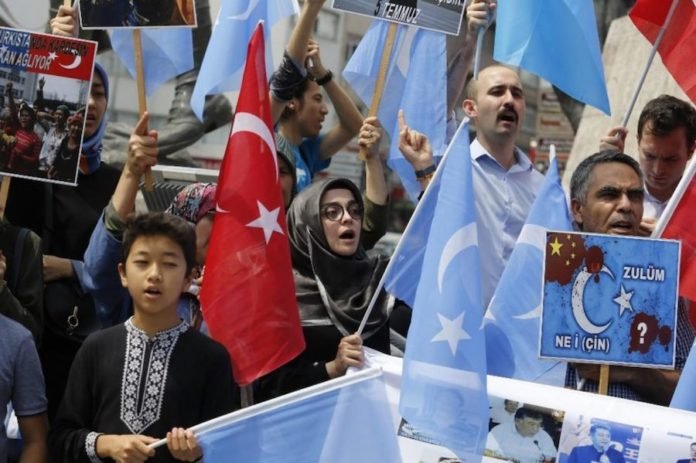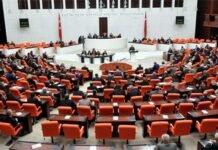Turkey is accused of detaining Uyghur refugees for alleged ties to the Islamic State in Iraq and the Levant (ISIL) and sending them to removal centers for deportation to China.
According to the Gazete Duvar news website, Turkish police raided the homes of some Uyghur refugees on the night of January 18 and detained between 10 and 15 of them. Amine Bekir, 40, was one. According to her daughter Aliye Bekir, she was first taken to a police station and then to a removal center in the Silivri district of İstanbul. She was released the following night.

Speaking to Alper Budka of Gazete Duvar, Aliye said the police officers treated them well when they came to their house but that wasn’t the case with Abdullah Metseydi, another Uighur who was detained that day. “They pointed a gun to his head,” she said.
According to his wife Melike, who spoke to Radio Free Asia’s Uyghur service, the police asked Abdullah Metseydi if he had ever called for jihad against China. He said, “No, I’ve never heard of any such thing.” In response, the police said he would directly be deported to China together with his wife if he was ever involved in any such activity.
Melike Metseydi said the police made him sign many documents without the presence of his lawyer. When she asked when her husband would be back, one of the officers said he would be sent back to China. Yet another officer said he would be back after his interrogation was over and that he could get information from the Kanarya Police Station in the Sefaköy district of İstanbul.
When Melike went to the police station in the morning, though, she was told her husband was sent to the removal center in Silivri. He is still under detention.
Aliye Bekir says the Turkish government is adopting the same tactics as the Chinese against Uyghurs in Turkey. “When we were in East Turkestan [Xinjiang Uyghur Autonomous Region of China], if Chinese authorities wanted to arrest someone they would basically say that person was an ISIL militant,” she says. “We are experiencing something similar today.”
Turkey has been a destination for thousands of Uyghurs fleeing China and has become home to a sizable Uyghur diaspora. But a Turkey-China extradition treaty that was signed in 2017 that is still awaiting ratification by the Turkish parliament led to fears that it could be used to target Uyghurs living in Turkey.

According to a Nordic Monitor report, the text of the treaty contains ambiguous phrases that might trigger the extradition of scores of Uyghurs from Turkey and violate extradition mechanisms regulated by the European Convention on Extradition (ECE), to which Turkey is a party.
Unlike similar treaties, Article 2 (2) of the Turkey-China deal reveals that “it shall not matter whether the laws of both Parties place the offence within the same category or describe the offence by the same terminology.” According to the article, the parties could request the extradition of its citizens despite the fact that the offense does not fall within the scope of the provisions of the other party’s relevant laws.
The treaty, which was signed during Turkish President Recep Tayyip Erdoğan’s visit to Beijing in 2017, was ratified by the Chinese side on December 26, 2019.
Speaking to journalists about the questions surrounding the extradition treaty, Justice and Development Party (AKP) spokesperson Ömer Çelik said this was just a common extradition treaty that Turkey signs with various countries. Underlining that the treaty was in line with international law, Çelik said Turkey has similar agreements with 32 countries.
“It is wrong to present this treaty as if it were against our Uyghur brothers,” Çelik said. “This is an agreement on the extradition of criminals.”
Aliye Bekir thinks otherwise. According to her, Uyghurs are no longer safe in Turkey. “We don’t expect any brotherhood from Turkey anymore,” she says. “All we ask [them] is to show some humanity.”

Professor İlyas Doğan of Ankara University’s faculty of law says he suspects that the Turkish government is laying the groundwork for the implementation of the extradition treaty. Doğan says for now Uyghurs who have limited social contacts are targeted.
“They usually raid their houses around midnight. They say the reason for their detention is due to membership in ISIL,” Professor Doğan says. “Yet, they don’t direct any ISIL-related accusations during their detention.”
According to his account, they are held at the nearest police station for a couple of days and then sent to removal centers. Doğan says this was exactly what happened with Amine Bekir. The authorities decided to deport her but then released her, at least for now.
According to Nureddin İzbasar of the East Turkestan Human Rights Association, similar operations have been carried out since 2017. He says it is very difficult to get details about the investigations into Uyghurs especially because the operations are conducted by the counterterrorism police. That’s why they still don’t know how many people were detained on the night of January 18.
The extradition of asylum seekers in Turkey has caused an outcry from human rights activists in the past. In 2019 Iranian nationals Saeed Tamjidi (27) and Mohammad Rajabi (25), who sought asylum in Turkey, were extradited to Iran by the Turkish government despite the knowledge that they could face the death penalty.
Under international human rights law the principle of non-refoulement prohibits states from transferring or removing individuals from their jurisdiction or effective control when there are substantial grounds for believing that the person would be at risk of irreparable harm upon return, including persecution, torture, ill-treatment or other serious human rights violations. Under international human rights law, the prohibition of refoulement is explicitly included in the Convention against Torture and Other Cruel, Inhuman or Degrading Treatment or Punishment (CAT) and the International Convention for the Protection of All Persons from Enforced Disappearance (ICPPED).















[…] with her kids. This kind of treatment has become routine for Uyghurs in Turkey, who now live in fear of further […]
[…] her kids. This kind of treatment has become routine for Uyghurs in Turkey, who now live in fear of further […]